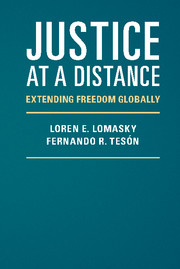9 - Beyond Justice at a Distance
Published online by Cambridge University Press: 05 November 2015
Summary
The persistent theme of this book is that the first precept of justice toward distant others (not to mention those who are close at hand) is to leave them alone. Much of the misery of the world's downtrodden is attributable to violation of this precept. The lion's share of baleful interference is produced domestically, but wealthy countries are not without their own share of blame for creating avoidable distress. It is not acceptable to block trade activities that cross borders or peaceful mobility by persons who wish to work, study, or reside in a country other than the one whose citizenship they hold. Nor is assistance tendered to foreign despots in service of oppressing their own nationals consistent with respect for rights. We have also insisted that these wrongs to foreign nationals simultaneously violate the rights of nationals. A Michigan employer who is prevented from hiring a willing Mexican national is interfered with in his projects just as much as if he were not allowed to contract with someone from Massachusetts. Trade protectionism harms would-be consumers of goods produced abroad. And so on. These restraints are so drearily familiar that they are not apt to impinge on our consciences with the vivacity of a mugging, yet our policies toward distant others – and toward our own conationals – constitute literally millions of muggings annually.
However, although noninterference is the first precept of justice, there are others. One is compensation for prior violations. For example, a wedding party rained on by errant drone missiles deserves recompense for harms done. This sort of case is clear-cut. More arguable are claims to compensation for historical wrongs such as American slavery or African colonialism. Our view is that these are doubtful for at least two reasons. First and most important, many of those who were the direct victims of these practices have long since passed from the scene, so it is beyond the capacity of any earthly justice to make them whole. Second, the assessment of historical counterfactuals is pervasively conjectural and thus is not capable of strongly supporting claims for compensation. Let us assume that, say, French occupation of Algeria constituted wrongs to the inhabitants of that territory; do contemporary Algerians stand as victims of that episode or perhaps as beneficiaries?
- Type
- Chapter
- Information
- Justice at a DistanceExtending Freedom Globally, pp. 261 - 278Publisher: Cambridge University PressPrint publication year: 2015



